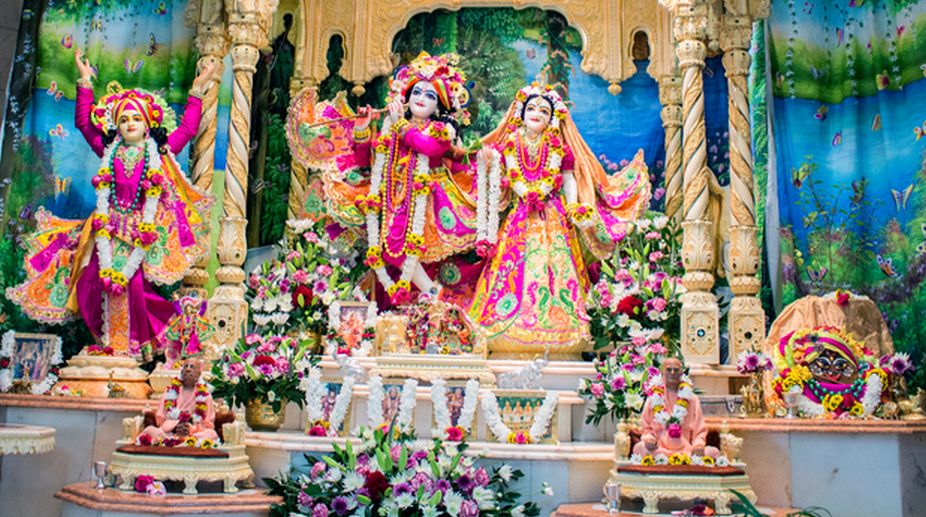Poila Baisakh: Significance of the rich tapestry of this celebration
Discover the richness of Poila Baisakh, the Bengali New Year celebration, marked by traditions, feasts, and cultural events across West Bengal.
A festival of gratitude and love, Govardhan Pooja reminds us against blind faith

Representational Image (Getty Images)
Govardhan Pooja is celebrated on the very next day of Diwali across India in commemoration of Lord Krishna’s victory over Lord Indra. The festival is famous as ‘Annakut’ pooja as well. A heap of grain is worshipped on this day along with the idol of Lord Krishna in the attire of ‘Giridhar’. This name was given to the Lord after he lifted Govardhan Parvat on his little finger of the right hand for seven days and seven nights continuously.
Govardhan Pooja is one of the most important Hindu rituals performed with immense gratitude, passion and zeal. There are many legends behind the festival.
Govardhan Parvat is situated at Braj bhoomi near Mathura in Uttar Pradesh. People of Gokul (a village in Braj) used to worship Lord of rain Indra, so that he continues to grace the people of Braj by providing rain as and when required. To please the Lord, the villagers used to prepare a sacrifice that had been a ritual for many years. The ignorant people did so out of fear that if Lord Indra would get angry, he won’t allow rain in their region and there will be scarcity of grains and fodder. Seeing this, little Krishna debated that the farmers should only do ‘Karmas’ to the best of their abilities rather than conducting sacrifices like this for any natural phenomenon. Finally, convinced by Krishna, the inhabitants of Braj stopped performing puja of Indra Dev and instead started worshipping Govardhan Mountain. Due to this, lord Indra vented his anger upon villagers of Vrindavan by way of heavy rain showers that led to heavy floods. At that time of crisis, Lord Krishna took the charge and ensured the safety of villagers and cattle. He offered prayers to Govardhan Mountain and lifted it to give shelter to everyone. The false pride of Lord Indra shattered into pieces. With folded hands, he prayed to Krishna for forgiveness. Arrogant Indra accepted his defeat and Shri Krishna being the supreme power bestowed his grace on him and enlighten him about his duties and dharma. Since then, Lord Krishna was known as Giridhar and Govardhan Pooja came into existence.
Advertisement

This is a festival in which devotees prepare and offer a large variety of vegetarian food to Lord Giridhar as a mark of gratitude. 56 or 108 dishes known as bhog are offered to the Lord. Firstly, the idol of Krishna is made to take bath in milk in the temples at Nathdwara and Mathura. Then the idol is decked up in cherished silk clothes and precious jewellery studded with diamonds, pearls and precious stones. The colour of clothes is usually red, yellow or saffron – the auspicious one according to Hindu scriptures. Many communities also worship cow. Besides creating a hillock of food, people also create hillocks of cow dung and celebrate this day dancing around this hillock.
Govardhan festival is more focussed on the prayer ceremony for the deity. It is majorly celebrated in Haryana, Uttar Pradesh, Punjab and Maharashtra. The celebration is done with different names in different parts of the country according to the significance of the festival that is prevalent in that region. The day is known as ‘Bali Pratipada’ in many parts of the country. The legend associated with it is that Lord Vishnu in his ‘Vamana’ avatar defeated king Bali. It is believed that King Bali comes out from pataal lok every year on the day of Govardhan Puja to visit his kingdom on earth. This day is also known as ‘Gudi Padwa’ in Maharashtra. Here, the celebration is in the form of appreciation of the love and respect shared by a married couple. The wife applies kumkum on her husband’s forehead, performs aarti and prays for his well-being. In return, husband gifts his wife a precious saree or some jewellery as a token of love. In Gujarat, the day is celebrated as ‘Gujarati New Year’. All the neighbours come together and perform puja of the deities followed by a communal meal, dance and exchange of wishes.
The festival gives emphasis on valuing the gifts that nature has bestowed on human beings. Nature must be conserved and cared for. Which day would be better than this day to pledge so?
Advertisement